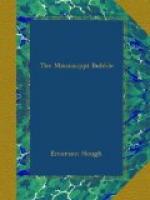“To the offices of the Bank of England,” he directed. And forthwith he was again jogging through the crowded streets of London.
The offices of the Bank of England, to which this young adventurer now so nonchalantly directed his course, were then not housed in any such stately edifice as that which now covers the heart of the financial world, nor did the location of the young and struggling institution, in a by-street of the great city, tend to give dignity to a concern which still lacked importance and assuredness. Thither, then, might have gone almost any young traveler who needed a letter of credit cashed, or a bill changed after the fashion of the passing goldsmiths.
Yet it was not as mere transient customer of a money-changer that young Law now sought the Bank of England, nor was it as a commercial house that the bank then commanded attention. That bank, young as it was, had already become a pillar of the throne of England. William, distracted by wars abroad and factions at home, found his demands for funds ever in excess of the supply. More than that, the people of England discovered themselves in possession of a currency fluctuating, mutilated, and unstable, so that no man knew what was his actual fortune. The shrewd young financier, Montague, chancellor of the exchequer, who either by wisdom or good fortune had sanctioned the founding of the Bank of England, was at this very time addressing himself to the question of a recoinage of the specie of the realm of England. He needed help, he demanded ideas; nor was he too particular whence he obtained either the one or the other.
John Law was in London on no such blind quest as he had himself declared. He was here by the invitation, secret yet none the less obligatory, of Montague, controller of the financial policy of England. And he was to meet, here upon this fair morning, none less than my Lord Somers, keeper of the seals; none less than Sir Isaac Newton, the greatest mathematician of his time; none less than John Locke, the most learned philosopher of the day. Strong company this, for a young and unknown man, yet in the belief of Montague, himself a young man and a gambler by instinct, not too strong for this young Scotchman who had startled the Parliament of his own land by some of the most remarkable theories of finance which had ever been proposed in any country or to any government. As Law had himself arrogantly announced, he was indeed a philosopher and a mathematician, young as he was; and these things Montague was himself keen enough to know.
It promised, then, to be a strange and interesting council, this which was to meet to-day at the Bank of England, to adjust the value of England’s coinage; two philosophers, one pompous trimmer, and two gamblers; the younger and more daring of whom was now calmly threading the streets of London on his way to a meeting which might mean much to him.




